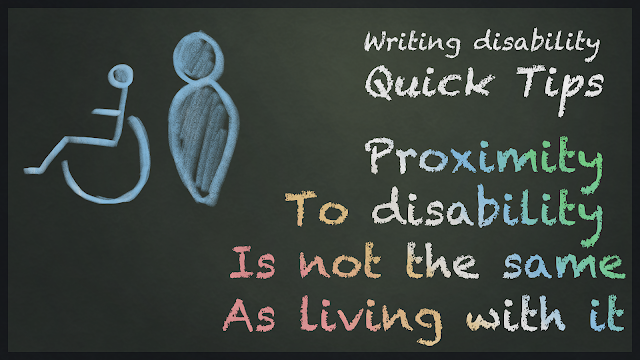Proximity to disability is not the same as living with it - Writing disability quick tips
I see the most vehement pushback like this from parents of disabled children. the parents who are their child's advocates, their carers, they see everything their kids go through and have been with them through it all, so they "know what they're talking about already". And the thing about that is, while it means you have much, much more experience with the disability in question, it's not the same as direct experience living with it. Don't get me wrong, it's still an incredibly valuable experience to have, I'm not saying to disregard it, but it's not the same as having that disability. And when you're writing about characters who are disabled, and telling those stories to a public who already have a lot of misinformation about us going in, that lived experience is very, very important.
This isn't unique to parents of course, like I said, I've seen the same kind of pushback from children, friends and other loved ones of disabled people, and honestly, as someone who's been on both sides of the conversation (being a disabled person, but also having loved ones with disabilities different to my own), I do get where it comes from. But no matter how close you are with your disabled loved one, no matter how much you talk, no matter how much they explain everything, unless you yourself have that same disability, it's incredibly hard to understand the details of what life with a disability is like.
Let me use my partner as an example:
Often times, before these larger articles go up, I run them by my partner to ensure the tone and message I want to get across is actually what’s being conveyed. Which means he’s read pretty much every single article I’ve written on this blog. We talk about disability representation and tropes a lot, and he is one of the only people who sees my unmasked and unfiltered reactions to media when it’s done poorly. He’s also done a great deal of his own research on the subject, and worked with other disability sensitivity readers for his own writing projects. Not to mention, well, we live together, he sees pretty much every part of my day-to-day life and he’s one of the only people who doesn't share my disability who I talk to about the more complex emotions that come with it.
I think it’s pretty fair to say he’s quite knowledgeable on the subject of living with the specific disabilities I have for someone who doesn't have them. Despite that though, he still makes mistakes. He still misses things, and sometimes, internalised ableism - something everyone has, even disabled people - still creeps its way into his work. So do mistakes he simply didn't consider to run past me or his sensitivity readers. It’s not because he’s not listening or not trying, I’d confidently say he’s gone above and beyond in that regard, but it still happens. He still misses things that seem so obvious to me, specifically because of my lived experience as a disabled person who has to deal with these things all the time.
It’s not unique to him either. A lot of people in my life are aware of the issues I talk about, but struggle to recognise them in practice or struggle to understand why them being depicted poorly is a problem.
This isn't to discourage creators from trying, mind you. But just to serve as a reminder that everyone makes mistakes, and that's ok, so long as you're still trying and still listening. No matter how close you are to a disabled person, no matter how much work or effort you put into unlearning things like internalised ableism, it's still going to pop up occasionally. And that's fine, but it means that you still need to be open to the criticism you get from people with that disability.

Comments